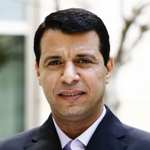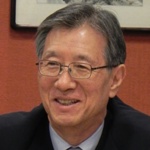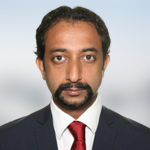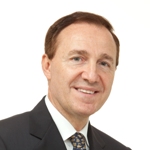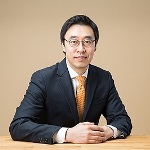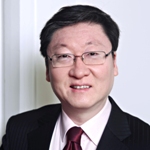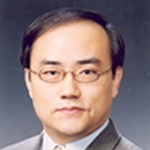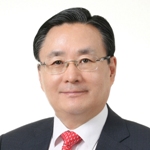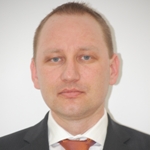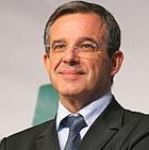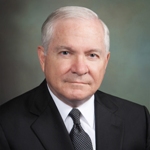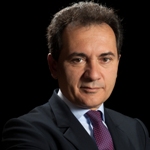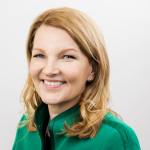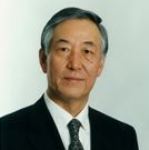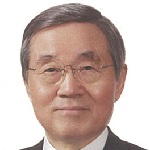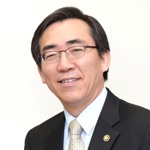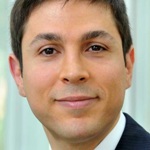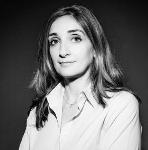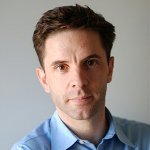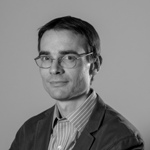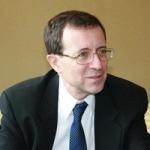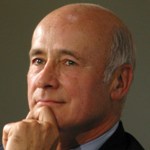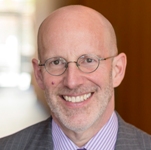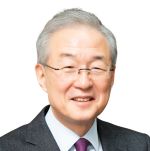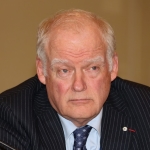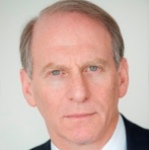Éminent dirigeant palestinien et membre du Conseil législatif palestinien (CLP) depuis son élection en 2006. En tant que membre de l’équipe de négociation palestinienne, il a pris part aux discussions qui ont fait suite à la signature des Accords d’Oslo. En 1994, il a créé le Service Palestinien de Sécurité Préventive (SPSP) à Gaza. Il a exercé la fonction de conseiller pour la sécurité nationale en 2002 et en 2007 et de ministre d’État à la sécurité intérieure en 2003. Il a été élu membre du comité central du Fatah lors de sa 6e conférence, qui s’est tenue à Bethléem en août 2009.
Chang Dal-joong
Professeur émérite en science politique et en relations internationales à l’université nationale de Séoul. Il est actuellement membre du comité consultatif pour les affaires politiques au ministère des Affaires étrangères. Il a été boursier Fullbright et membre à deux reprises de la Japan Foundation. Avant de rejoindre l’université nationale de Séoul, il avait enseigné à l’Académie militaire de Corée et à l’université jésuite de Sogang. Il est titulaire d’une licence et d’un master de l’université nationale de Séoul et a également obtenu un doctorat en science politique à l’université de Berkeley, en Californie.
Manu Mallikarjun
Entrepreneur social spécialisé dans les relations internationales et le développement. Il travaille actuellement sur une série de films pour laquelle, en tant que cinéaste, il a documenté ses interactions avec des économistes, des activistes, des politiciens, des diplomates, des universitaires et des chefs spirituels, dans le but d’explorer les voies potentielles vers un monde pacifique, juste et durable. Le premier film intitulé Birth of a Poet a officiellement été sélectionné par le Global Nonviolent Film Festival, 2019. Il a également écrit un livre à paraître prochainement, dans lequel il partage ses découvertes et ses réflexions sur ce qu’il décrit comme « une harmonie mondiale toujours insaisissable ». Travaillant dans l’immobilier depuis plusieurs années, il a également acquis une grande expérience dans le secteur privé dans les domaines des technologies de l’information et de la communication, de la finance et de l’externalisation. Il est ingénieur en électronique et communication (R.V. College of Engineering, Bangalore) et titulaire de trois masters : un master en relations internationales de la School of Advanced International Studies de l’Université Johns Hopkins, un master en développement immobilier de la School of Architecture and Design de l’université IE à Madrid, et un master en création littéraire de l’université Pompeu Fabra. Il parle couramment l’anglais, l’espagnol, l’hindi et le telugu.
Luigi Colantuoni
Délégué général du groupe Total pour le Japon et président de la succursale de Tokyo de Total Trading International, S.A. Il est également vice-président de la Chambre de commerce et d’industrie française au Japon. Il a commencé sa carrière en Italie dans l’industrie pétrolière et chimique. En 1986, il intègre la division de galvanoplastie de Schering. En 2006, aux Etats-Unis, il est nommé PDG de Sartomer. Il devient en 2008 directeur associé du Département des Finances de la branche Chimie de Total S.A. à Paris. Il a obtenu son diplôme en génie chimique à l’Université de Naples et un MBA à l’INSEAD à Fontainebleau.
Yu Hyun-Seok
11e président de la Fondation de Corée. Avant de rejoindre la Fondation, il a été vice-président de la Korean Association of Area Studies et président du Comité d’échange académique Corée-Thaïlande au sein de l’Association de sciences politiques coréenne, et professeur au département de sciences politiques et de relations internationales à l’université Kyung Hee, où il a acquis de nombreuses connaissances pratiques et une expérience de l’évaluation des mesures prises par les gouvernements. Il est également membre du Policy Advisory Committee du ministère de l’Unification. Il est diplômé du département des sciences politiques et d’études internationales de l’université Yonsei à Séoul et détient un doctorat en sciences politiques de l’université Northwestern en Illinois.
Philippe Li
Avocat chargé du conseil aux clients internationaux basés en Corée dans leurs projets en Europe et à travers le monde chez Kim & Chang depuis 2016. Avocat associé en projets & infrastructures et fusions-acquisitions et leader de la pratique Corée chez Jones Day (2011-2016). Il publie régulièrement des tribunes libres dans la presse française, dont le Figaro et le Monde. Il a en outre écrit plusieurs ouvrages dont « S’implanter en Corée », « Guide des Affaires en Corée » (CFCE), « Now it’s time for Europe » (Kyobo Publishing), et prochainement « Delivery » (Eyrolles). Il a été associé chez Kim & Chang (2002-2011). Parallèlement, après avoir été président de la Chambre de commerce et d’industrie franco-coréenne (FKCCI) (2005-2011), il est aujourd’hui membre de son conseil d’administration. Il est par ailleurs administrateur trésorier de la CCI France International. Il est aussi décoré de l’Ordre National du Mérite et citoyen d’honneur de la ville de Séoul.
Kim Sung-han
Professeur en relations internationales à l’Ecole supérieur d’études internationales (GSIS) depuis 2007 et directeur du Ilmin International Relations Institute depuis 2013 à l’Université de Corée. Il a été vice-ministre des Affaires étrangères et du Commerce (2012-2013). Avant de commencer sa carrière au gouvernement, il était professeur et doyen adjoint au GSIS. Il est aujourd’hui président du Comité national coréen du Conseil de sécurité et de coopération dans l’Asie et le Pacifique. Il est titulaire d’un doctorat de l’Université du Texas à Austin.
Ju Chul-Ki
Président, Overseas Koreans Foundation. Précédemment, il était Secrétaire Principal aux Affaires étrangères et à la Sécurité nationale auprès du président de la République de Corée. Il était auparavant vice-président et secrétaire général du Global Compact Korea Network et a enseigné à l’Université nationale de Séoul en tant que professeur invité. Il a mis fin à son service diplomatique fin 2006 après une longue carrière qui l’a mené jusqu’au poste d’ambassadeur en France et à l’UNESCO. Il a également exercé la fonction d’ambassadeur aux Nations Unies à Genève, au Maroc et également en Mauritanie. Il a été directeur général des Affaires économiques au ministère des Affaires étrangères coréen. Il a étudié à l’Université nationale de Séoul et à l’Institut international d’administration publique en France. Il est titulaire d’une maîtrise en sciences politiques de l’Université libre de Bruxelles.
Paul Ichim
Vice-président d’Eximbank depuis mars 2009. Il a été directeur de la succursale à Bucarest de Corporate Bucur Obor – ING Bank NV Amsterdam, ainsi que directeur des Institutions financières de la succursale de Bucarest d’ING Bank NV Amsterdam. Il a exercé la fonction de conseiller auprès du secrétaire d’État et du ministre des Finances publiques au sein du ministère des Finances publiques (2000-2005). Il est diplômé de l’Académie des études économiques de Bucarest.
Thierry Mariani
Député des Français établis dans la 11e circonscription de l’étranger (Asie, Russie, Océanie) de 2012 à 2017. Il est également membre de la Commission des Affaires étrangères, membre titulaire de la délégation française à l’Assemblée parlementaire du Conseil de l’Europe et co-président du Dialogue Franco-Russe. Il a été secrétaire d’État puis ministre chargé des transports (2010-2012). En 2009, il est nommé par Nicolas Sarkozy représentant spécial de la France pour l’Afghanistan et le Pakistan. Il est diplômé de l’Institut d’études des relations internationales de Paris.
Robert M. Gates
Ancien secrétaire américain à la Défense de décembre 2006 à juillet 2011 sous les présidences de George W. Bush et Barack Obama. Auparavant, il était président de l’université Texas A&M, la septième plus grande université des États-Unis. Il a également exercé la fonction de directeur de la CIA de 1991 à 1993 sous la présidence de George H.W. Bush. Il a commencé sa carrière à la CIA en 1966 et a travaillé dans le renseignement pendant près de 27 ans. Il a reçu en 1974 un doctorat en histoire russe et soviétique de l’université de Georgetown à Washington DC.
Božidar Djelić
Associé-gérant au sein de l’équipe de conseil aux gouvernements de Lazard depuis 2014. Au préalable, il a occupé la fonction de vice-Premier ministre de la Serbie (2007-2011). De 2001 à 2004, il a été ministre des Finances et de l’Économie de la Serbie. Il a également dirigé les activités du Crédit Agricole pour l’Europe de l’Est et l’URSS et a travaillé en tant que directeur associé chez McKinsey & Company à Paris et dans la Silicon Valley. Il est titulaire d’un MBA de la Harvard Business School, d’un MPA de la J.F. Kennedy School of Government (Université de Harvard) et d’un MA en économie de l’EHESS Paris.
Vuk Jeremić
Professeur à l’école d’affaires internationales de Sciences Po Paris. Président du Center for International Relations and Sustainable Development, un think tank consacré aux politiques publiques mondiales basé à Belgrade, Vuk Jeremić est également rédacteur en chef du magazine trimestriel Horizons – Journal of International Relations and Sustainable Development. En 2016, il participe à l’élection officielle du secrétaire général de l’ONU et termine en deuxième position. En 2012, il est élu président de la 67ème session de l’Assemblée générale de l’ONU. Au cours de son mandat, il a joué un rôle de premier plan dans l’orientation de l’ONU vers l’établissement de l’Agenda 2030 pour le développement durable. Il a été ministre des Affaires étrangères de la Serbie de 2007 à 2012. M. Jeremić est membre du Conseil de direction du Réseau des solutions pour le développement durable des Nations unies (UN SDSN) et administrateur du Cambridge China Development Trust au Royaume-Uni.
Michèle Boos
PDG du constructeur de voitures électriques Mia Generation et du cabinet de conseil aux entreprises Focus Asia France. Michèle Boos a fait partie de la première vague d’entrepreneurs venus s’installer à Saint-Pétersbourg lors de la perestroïka initiée par Mikhaïl Gorbatchev. Elle s’y est spécialisée dans le redressement d’entreprises de l’ancien bloc communiste. En 1999, elle a fondé le portail en ligne Wall Street Reporter à New York et est devenue éditrice des revues Art Tribune, Antique Doll Magazine et Collectors Eye. Elle est diplômée de l’université de Fordham de New York et de l’université de Strasbourg.
Mari Kiviniemi
Mari Kiviniemi est directrice générale de la Fédération finlandaise du commerce depuis 2019. Elle a occupé le poste de secrétaire générale adjointe de l’OCDE de 2014 à 2018. 41ème Première ministre de la Finlande de 2010 à 2011, elle a précédemment occupé différents postes au sein du gouvernement finlandais, notamment celui de ministre de l’Administration publique et des collectivités locales, de ministre du Commerce extérieur et du Développement et de ministre des Affaires européennes. Elle a été membre du Parlement de 1995 à 2014, participant et présidant un grand nombre de commissions. Cheffe adjointe du Parti du Centre finlandais de 2003 à 2008, elle a été élue cheffe du parti en 2010. Elle siège au conseil d’administration de Blic Public Affairs et au conseil de surveillance de Messukeskus Helsinki. Elle a été membre de nombreux autres conseils d’administration, notamment du conseil municipal d’Helsinki, de la Fondation de l’Opéra national finlandais et de Lännen Tehtaat Oyj. Elle est titulaire d’une maîtrise en sciences sociales de l’université d’Helsinki.
Kim Chulsu
Conseiller principal chez Lee International IP & Law Group à Séoul et Président de l’Institute for Trade and Investment (ITI), une organisation de recherche et de conseil affiliée à Lee International, un cabinet d’avocats basé à Séoul. Il enseignait auparavant la politique commerciale à l’université de Sejong, dont il a été le président de 2002 à 2005. De 1995 à 1999, il a exercé la fonction de directeur général adjoint de l’OMC. Il a été ministre du Commerce, de l’Industrie et de l’Énergie de la République de Corée (1993-1994). Il a également été nommé ambassadeur du commerce international de la Corée en 1994. Il est diplômé de l’université Tufts et de l’université du Massachusetts, où il a obtenu un master et un doctorat en science politique.
Hyun Hong-Choo
Il a exercé la fonction d’ambassadeur de la République de Corée aux États-Unis (1991-1993) et d’ambassadeur pour la mission d’observation permanente auprès des Nations Unies. Il a été membre de la Commission spéciale pour la révision de la Constitution, de la Commission pour la transition présidentielle et du Conseil consultatif de la Cour constitutionnelle coréenne. Il est actuellement membre du Conseil commercial États-Unis-Corée du Sud, du Conseil consultatif sur l’unification nationale et de la Commission sur l’évaluation de la sécurité nationale. Il est diplômé de l’université nationale de Séoul et de la Columbia Law School de New York.
Cho Tae-yul
2e ministre adjoint des Affaires étrangères de la République de Corée depuis 2013. Il est entré au ministère des Affaires étrangères en 1979. Il a occupé plusieurs postes tels que Conseiller pour la mission permanente de la République de Corée auprès de l’Office des Nations Unies et d’autres organisations internationales à Genève, en Suisse (1996-2000), et ambassadeur pour la mission permanente de la Corée auprès de l’Office des Nations Unies et d’autres organisations internationales, toujours à Genève (2005-2006). Il a également exercé la fonction de ministre adjoint du Commerce (2006-2008) et d’ambassadeur de la Corée en Espagne (2008-2011). Il est diplômé de l’université nationale de Séoul et a étudié à l’université d’Oxford, au Royaume-Uni.
Ribal Al-Assad
Fondateur et directeur de l’Organisation pour la démocratie et la liberté en Syrie et président de la Fondation Iman. Engagé à l’échelle internationale dans la défense de la démocratie et de la liberté, Ribal Al-Assad intervient régulièrement au sein de divers programmes pour faire la promotion des droits de l’Homme. Il est particulièrement engagé en faveur du développement du dialogue et des rapports interreligieux entre musulmans, juifs et chrétiens tout autour du monde. Il est titulaire d’une licence en administration des affaires de l’InterAmerican University de New York et d’une maîtrise de l’université de Leicester au Royaume-Uni.
José Manuel Barroso
11e président de la Commission européenne (2004-2014). Il a été Premier ministre du Portugal de 2002 à 2004. Sa carrière politique commence en 1980 quand il rejoint le Parti social-démocrate (PSD). Il est élu président du parti en 1999 puis réélu trois fois. Il occupe également durant cette période le poste de vice-président du Parti populaire européen. Il a aussi été ministre des Affaires étrangères du Portugal (1992-1995). Il est titulaire d’un diplôme en droit de l’université de Lisbonne, ainsi que d’un diplôme en études européennes et d’une maîtrise en sciences politiques de l’université de Genève.
Marie-Claire Aoun
Directrice du centre Energie de l’Ifri et enseignante à l’Université Paris Dauphine. Elle a débuté sa carrière, dans le cadre de ses recherches doctorales, en 2004, au Centre de Géopolitique de l’Énergie et des Matières premières (CGEMP). Elle a été économiste à la Commission de Régulation de l’Énergie (CRE) (2008-2014). Elle est titulaire d’un doctorat en sciences économiques de l’Université Paris Dauphine et est l’auteur de nombreuses publications sur les questions énergétiques.
Justin Vaïsse
Historien français, il est directeur du Centre d’analyse, de prévision et de stratégie du Ministère des Affaires étrangères. À la tête d’une équipe de diplomates et de contractuels, il conseille le Ministre sur ses orientations de politique étrangère et nourrit le lien avec les milieux de la recherche en relations internationales. Normalien, agrégé et habilité à diriger des recherches, il est spécialiste de l’histoire contemporaine des États-Unis et de l’histoire des relations internationales. Il a été enseignant associé à Sciences Po Paris (1999-2006), à la School of Advanced International Studies (SAIS) de la Johns Hopkins University (2007-2013) et directeur de recherche à la Brookings Institution (2007-2013). Il a publié une dizaine d’ouvrages dont le dernier – Zbigniew Brzezinski, stratège de l’empire – est paru en 2016 (Odile Jacob).
Riccardo Sessa
Vice président de la Società Italiana per l’
Ben Scott
Conseiller principal de l’Open Technology Institute à la New America Foundation à Washington DC, ainsi que directeur des programmes à la Stiftung Neue Verantwortung à Berlin. Auparavant, il était conseiller pour l’innovation au sein du département d’État américain. Il a également dirigé le bureau de Washington de Free Press, une association à but non lucratif dédiée à la défense de l’éducation et l’intérêt publics dans les politiques d’information et de communication. Il a obtenu un doctorat en communication de l’université de l’Illinois.
Jérôme Pasquier
Ambassadeur de France en Corée du Sud. Il a occupé différents postes à responsabilités tels qu’ambassadeur de France en Croatie (2009-2012) et directeur général adjoint de la coopération internationale et du développement (2004-2009). De 1998 à 2002, il a occupé la fonction de consul général de France à Hong Kong et, de 1988 à 1992, il a été conseiller culturel à Séoul. Il est diplômé de l’École polytechnique et ancien élève de l’École nationale d’administration.
Joseph Nye
Professeur à la Kennedy School of Government de Harvard. Il a également été sous-secrétaire d’État adjoint à la Sécurité, aux Sciences et à la Technologie. Il a présidé le Conseil de sécurité national américain de non-prolifération des armes nucléaires. Il a aussi présidé le National Intelligence Council. En 1994 et 1995, il a occupé le poste de secrétaire adjoint à la Défense chargé des affaires de sécurité internationale. Il a écrit de nombreux livres, dont les plus connus sont : The future of Power (2011) et Soft Power: The Means to Success in World Politics (2004). Il est diplômé des universités de Princeton et d’Oxford et a obtenu un doctorat en sciences politiques de l’université Harvard.
Marcus Noland
Vice-président exécutif et directeur d’études au Peterson Institute for International Economics, où il travaille depuis 1985. Parallèlement, il est Senior Fellow au East-West Center. Auparavant, il était économiste au Council of Economic Advisers du Bureau exécutif du président des États-Unis. Il a occupé des postes dans la recherche ou l’enseignement dans plusieurs universités, dont l’Université Yale, l’Université Johns Hopkins, l’Université de Californie du Sud et l’Université de Tokyo. Il est diplômé du Swarthmore College et titulaire d’un doctorat de l’Université Johns Hopkins. Son ouvrage le plus récent Hard Target: Sanctions, Inducements, and the Case of North Korea (2017) a été co-écrit avec Stephan Haggard.
Bark Taeho
Président de Lee&Ko Global Commerce Institute, cabinet juridique mondial de premier plan en Corée. Il est également président du Seoul Forum for International Affairs (SFIA), professeur émérite et ancien doyen à la Graduate School of International Studies (GSIS) de l’université nationale de Séoul, président du comité coréen de la Commission trilatérale et co-président sur Foreum Corée-Canada. Il a été chercheur invité non résident au Belfer Center for Science and International Affairs de la Harvard Kennedy School. Il a participé à la Task Force sur le capitalisme mondial en transition de la Commission trilatérale en tant que membre de la région Asie-Pacifique. Il a été ministre du commerce du gouvernement coréen (de décembre 2011 à mars 2013). Au printemps 2013, il était candidat au poste de directeur général de l’OMC. Il a également été président de la Commission du commerce international du gouvernement coréen. Il a enseigné à Sciences Po, à l’Université de Stanford et à l’Université de Washington en tant que professeur invité. Il a également été chercheur invité au FMI et consultant pour la Banque mondiale et la BAD.
André Caillé
Administrateur de sociétés, dont Junex inc., une société d’exploration pétrolière et gazière, pour laquelle il agit à titre de conseiller stratégique senior. Il est membre du conseil d’administration de la Banque Nationale du Canada. Il a été Chancelier de l’université de Montréal, Président du Conseil mondial de l’énergie et sous-ministre de l’Environnement du Québec. Il a également été PDG d’Hydro-Québec et président de Gaz Métropolitain. Il a obtenu une maîtrise et un doctorat en physico-chimie à l’université de Montréal.
Richard Haass
Président du Council on Foreign Relations (CFR) depuis 2003. Il est l’auteur de douze livres, onze portant sur la politique étrangère américaine et un sur le management. De janvier 2001 à juin 2003, il a été directeur de la planification stratégique au ministère des Affaires étrangères des États-Unis, période pendant laquelle il était l’un des principaux conseillers du Secrétaire d’État américain Colin Powell. De 1989 à 1993, il a occupé le poste d’adjoint spécial du président George H. W. Bush, et de directeur principal pour les affaires du Proche-Orient et d’Asie du Sud, au sein du Conseil de sécurité national américain. Il est diplômé d’Oberlin College et de l’université d’Oxford.

